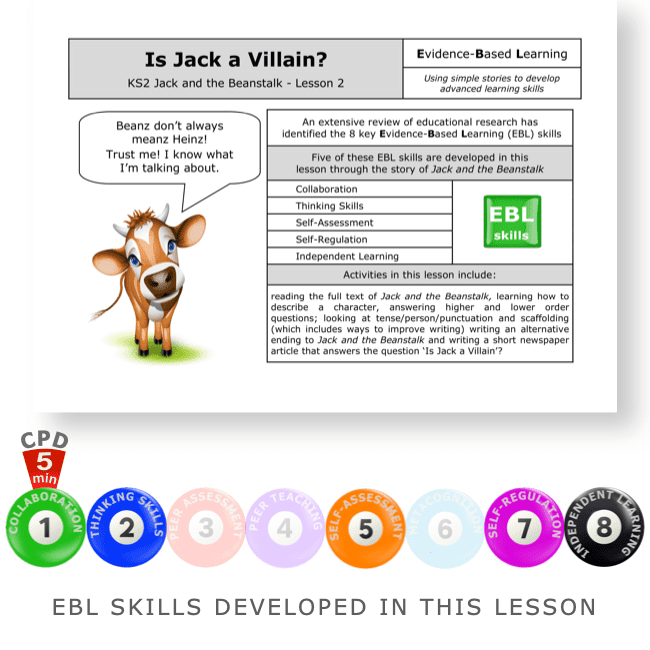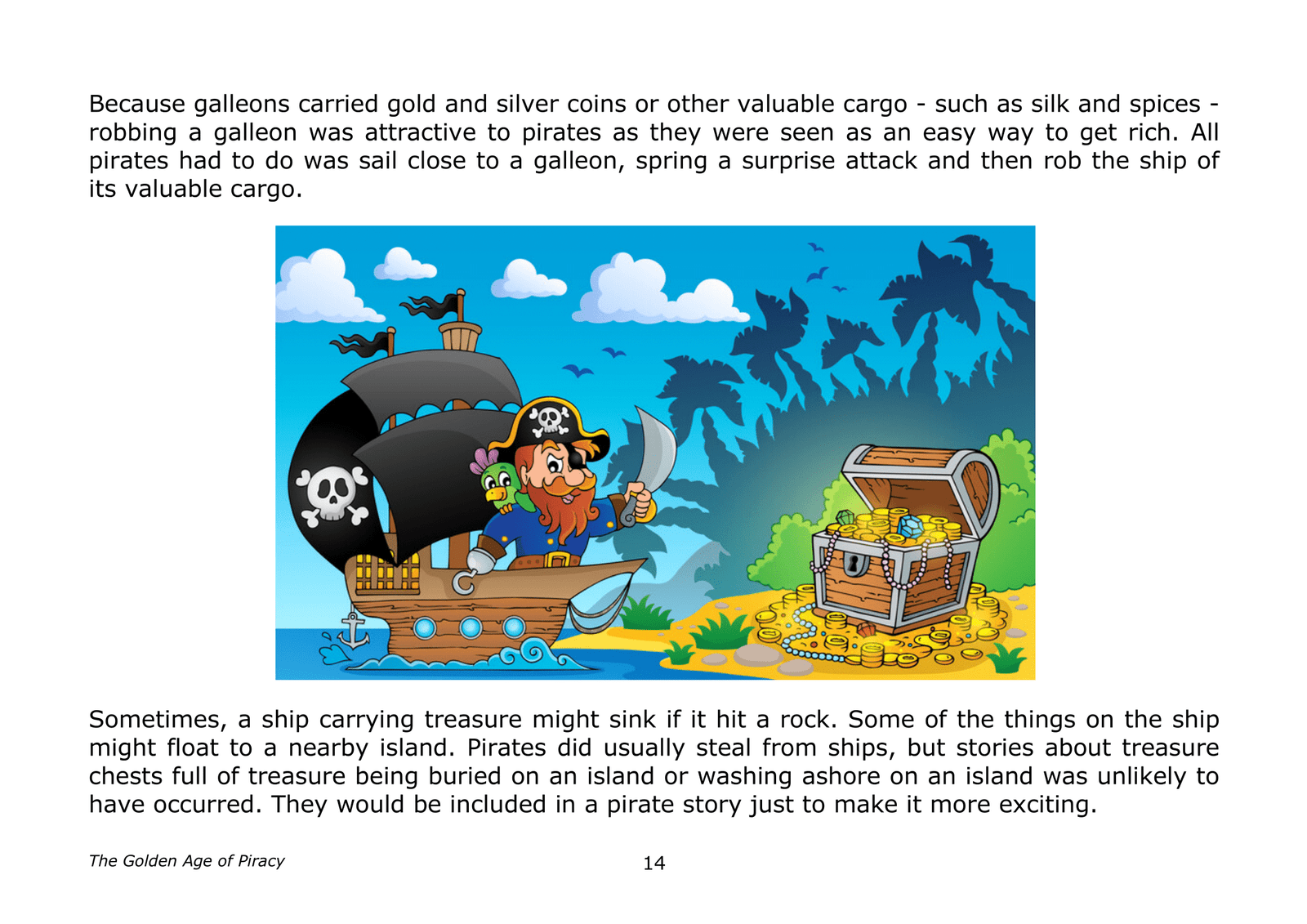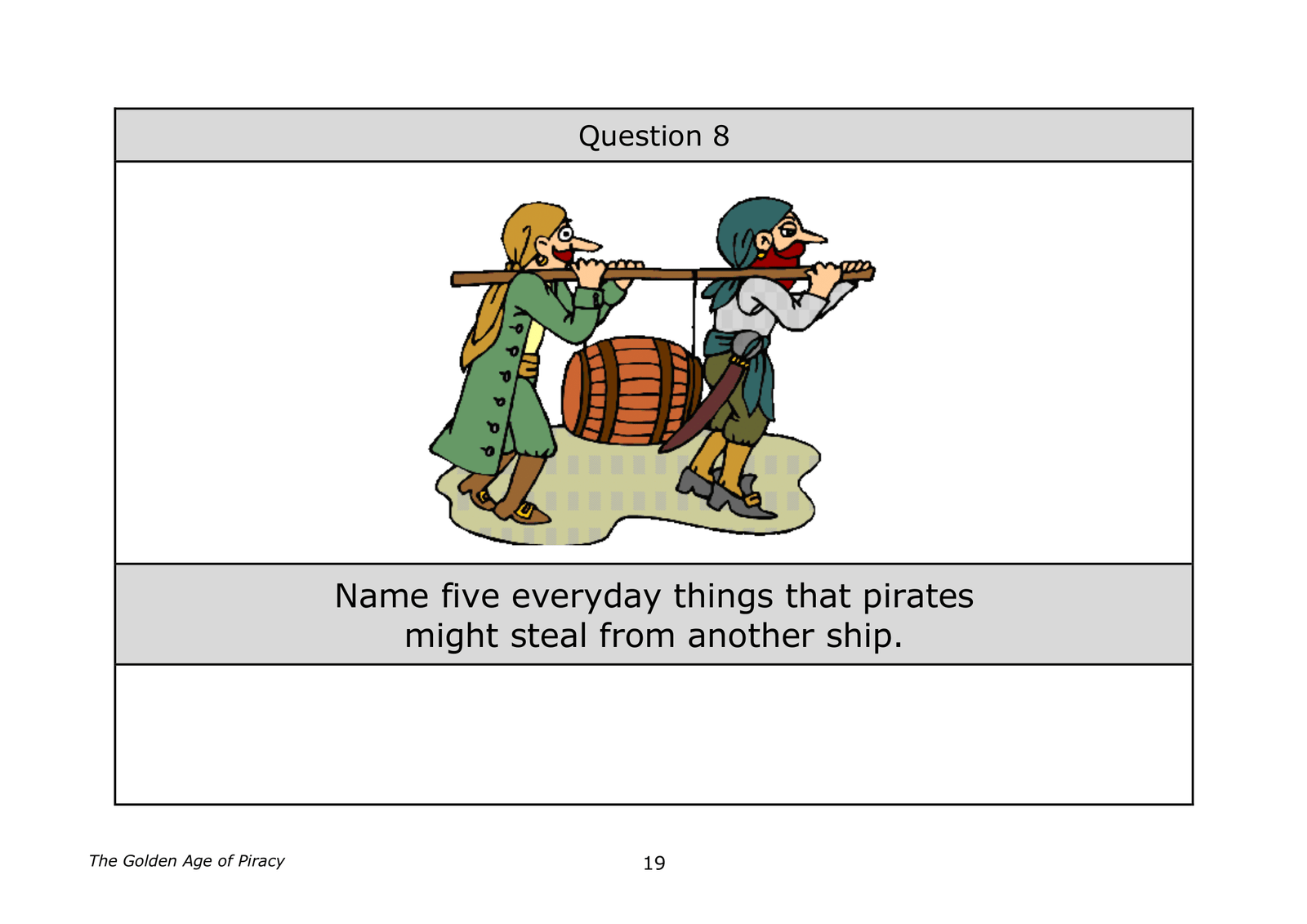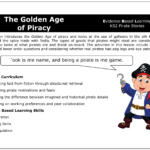Y5 The Golden Age of Piracy
£3.00
KS2 National Curriculum:
✓ Understanding historical facts about galleons, trade, and global routes
✓ Clarifying the setting and context of pirate stories
✓ Extracting information from non-fiction texts
✓ Collaborating with a partner to share and consolidate learning
This lesson introduces the Golden Age of piracy and looks at the use of galleons in the silk trade with China and the spice trade with India. The types of goods that pirates might steal are considered. This lesson also looks at what pirates ate and drank on-board. The activities in this lesson include answering higher and lower order questions and considering whether real pirates had peg legs and eye patches!
There is a five-minute evidence-based CPD activity at the end of this lesson which will develop classroom teachers’ skill set. This CPD consists of a research extract on collaboration with a five-minute activity based on this extract.
Description
Recommended Year Group: Year 5
Focus: Building historical background knowledge about pirates and trade
Skills Developed:
• Understanding historical facts about galleons, trade, and global routes
• Clarifying the setting and context of pirate stories
• Extracting information from non-fiction texts
• Collaborating with a partner to share and consolidate learning
• Reading – Comprehension: Retrieve and summarise non-fiction information
• Spoken Language: Discuss and explain historical context with a peer
• Thinking and Learning: Metacognition, collaborative explanation, and recall
These evidence-based learning (EBL) lessons are based on classroom practice that has been proven, by research, to maximise thinking, learning and attainment. From an extensive review of educational research, we identified the eight key classroom thinking and learning skills that were common across these research papers. We named these eight key skills “EBL skills”.
EBL skills have been proven by research to maximise learning because they combine the most productive thinking skills with the most effective learning behaviours. Each of our evidence-based learning lessons uses the English curriculum as a framework through which the eight EBL skills are delivered.
Teachers also have the opportunity to add to their own skill set or refresh their existing skills with our five-minute CPD activity, based on one of the EBL skills used in this lesson.
The skills in bold below are the EBL skills developed in this Pirate lesson. Click on each skill to learn more about that skill.
- Collaboration
- Thinking Skills
- Peer Assessment
- Peer Teaching
- Self-Assessment
- Metacognition
- Self-Regulation
- Independent Learning
1 review for Y5 The Golden Age of Piracy
Only logged in customers who have purchased this product may leave a review.
Related products
-


The Plot of a Pirate Story
£3.00 Add to basket £3.00Add to basket
£3.00Add to basketThis lesson looks at the main features of pirate stories including good and bad characters, treasure maps and typical plots. It also includes learning how to design a poster. Activities include designing a poster for the classroom to explain the plot of a pirate story and drawing a treasure map.
There is a five-minute evidence-based CPD activity at the end of this lesson which will develop classroom teachers’ skill set. This CPD consists of a research extract on collaboration with a five-minute activity based on this extract.
VIEW -


Is Jack a Villain?
£3.00 Add to basket £3.00Add to basket
£3.00Add to basketActivities in this lesson include reading the full text of Jack and the Beanstalk, learning how to describe a character, answering higher and lower order questions; looking at tense/person/punctuation and scaffolding (which includes ways to improve writing) writing an alternative ending to Jack and the Beanstalk and a short newspaper article that answers the question ‘Is Jack a Villain’?
There is a five-minute evidence-based CPD activity at the end of this lesson which will develop classroom teachers’ skill set. This CPD consists of a research extract on collaboration with a five-minute activity based on this extract.
VIEW -


Y5 Why Gold was Buried
£3.00 Add to basket £3.00Add to basket
£3.00Add to basketKS2 National Curriculum:
✓ Understanding bartering, currency, and trade in historical context
✓Explaining why treasure is buried and how maps are created
✓Completing a pirate plot story mountain
✓Exploring openings to pirate storiesThis lesson looks at why gold became so important and it introduces the concepts of bartering and trade. It also looks at why gold needed to be buried and considers the key role played by treasure maps in the plots of pirate stories. It also looks at the need to include good and bad characters. Activities include completing a story mountain outlining a possible plot for a pirate story and a task based on pirate story openings.
There is a five-minute evidence-based CPD activity at the end of this lesson which will develop classroom teachers’ skill set. This CPD consists of a research extract on collaboration with a five-minute activity based on this extract.
VIEW -


Y6 The Pirate Code
£3.00 Add to basket £3.00Add to basket
£3.00Add to basketKS2 National Curriculum:
✓ Analysing pirate laws and their underlying values
✓ Debating the fairness and consequences of behaviour at sea
✓ Writing reasoned responses about actions and their impact
✓ Using Bloom’s questioning to deepen reflectionThis lesson looks at the set of rules (the pirate code) that pirates had to follow when living on a ship. The activities in this lesson include answering higher and lower order questions (some scaffolded).
There is a five-minute evidence-based CPD activity at the end of this lesson which will develop classroom teachers’ skill set. This CPD consists of a research extract on metacognition with a five-minute activity based on this extract.
VIEW






Philipem (verified owner) –
We asked a.i. to evaluate this resource. This is what it said:
Teach English and Evidence-Based Learning Skills Through Pirate Stories
★★★★★
Engage your students while covering key curriculum areas with this motivating pirate resource!
Looking for a fun way to build key skills in your KS2 English lessons? This Golden Age of Piracy resource uses classic pirate stories to teach reading, writing, speaking and listening skills alongside vital evidence-based learning capabilities like collaboration, thinking skills and self-regulation.
Introduce the Exciting Pirate Genre
The pirate theme immediately engages most KS2 students. This resource taps into their natural curiosity by covering fascinating details of real pirate lives like the ships they sailed, the goods they stole, the food and drink they survived on, and even whether they really had peg legs and eye patches!
Embedded English Skills Development
While exploring the riveting world of historical piracy, students must read passages, answer questions, discuss ideas with a partner, and write responses. This strengthens comprehension, speaking, listening and written skills without it feeling like traditional English work.
Evidence-Based Learning Techniques
The resource is designed based on educational research into the evidence-based learning skills that maximise student outcomes. It develops collaboration through partner work, thinking skills via higher and lower order questions, and self-regulation by reflecting on the partner work process.
Easy to Implement
The self-contained lesson format makes it simple to deliver. All the content, activities and teacher guidance you need is provided in one place. There’s even a 5 minute CPD section to boost your own expertise in facilitating collaborative learning.
With the fact that this is actually a comprehensive, four-part pirate unit, I would give this lesson 5 stars. That checks the boxes for having engaging content, curriculum connections, evidence-based techniques, AND having enough depth/breadth for students to genuinely develop mastery of pirate history and key learning capabilities over multiple lessons.